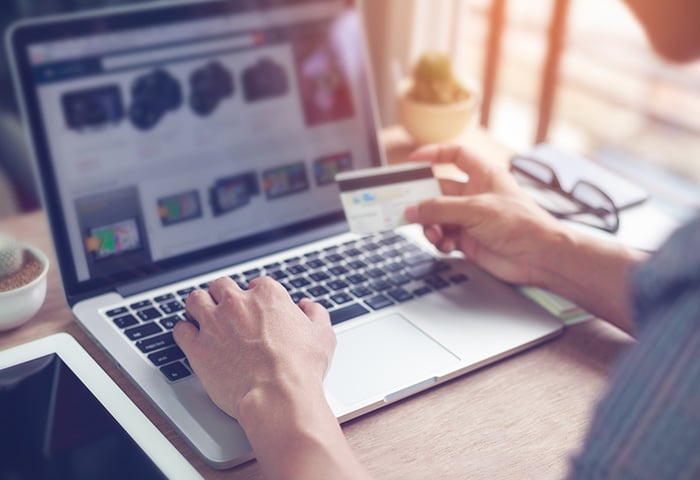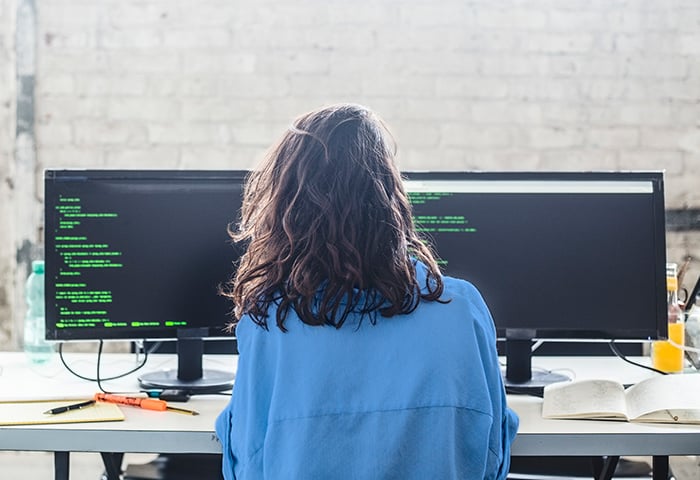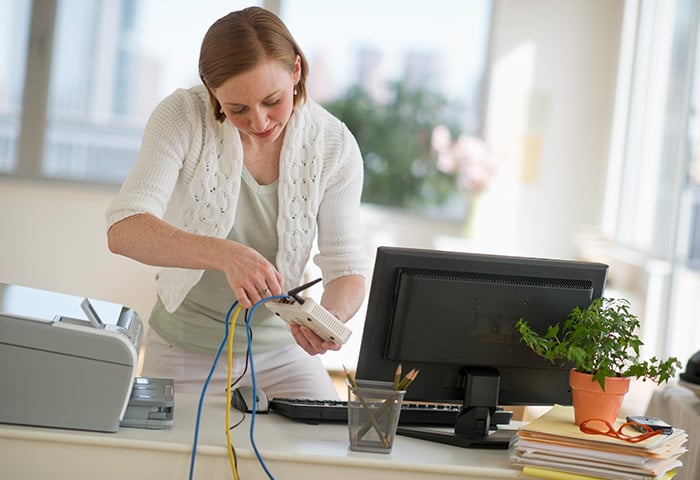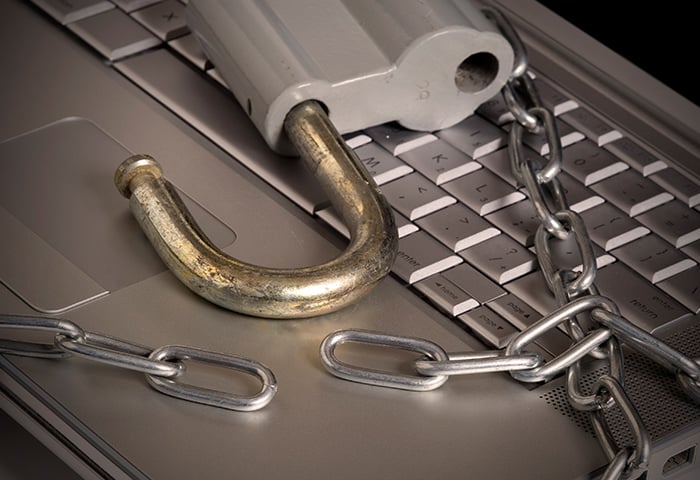How can I tell if someone has hacked into my email account?
The warning signs of an email hack all indicate that something is happening to your email without your control. If you’re locked out of your Gmail inbox, for example, that’s a strong sign that your Google account is hacked.
If you’ve been hacked, take recovery measures immediately. Here’s a detailed look at the most common indicators that your email may be compromised.
-
You’re locked out. After obtaining control, email hackers may change your email password to prevent you from getting back in. Make sure that you’re entering your password correctly — but if your email password doesn’t work anymore, you may have a compromised email account.
-
Your account settings have been changed. Critical account settings, such as your recovery email and phone number or 2FA options, shouldn’t be changed by anyone but you. If you notice these are different, you could have a hacked email account.
-
There are emails in your Sent folder that you didn’t send. If you didn’t send emails in your Sent folder, someone else may have. Emails that you didn’t send yourself are a strong indication of an email breach. But since some email hackers know to delete emails after they’ve sent them, you may not always notice this red flag.
-
You’ve received password change requests or confirmations. Hackers can go around to popular banks, social media platforms, eshops, and other sites and test your email address there. Unrequested password change emails can indicate that someone is trying to figure out which sites you use, then get control of your accounts.
-
Your contacts tell you. If someone’s hacked your email account and started sending strange emails to your contacts, you may start hearing about it. If people report receiving odd emails from you, your email account may be compromised.
-
You notice logins from unfamiliar IP addresses and locations. Your email provider should let you view the login history for your account. You’ll see the IP addresses used to access your account along with the location, and in some cases, the browser and device type. Unrecognized IP addresses may belong to an email hacker.
If everything’s normal on your email, but you’re noticing strange behavior on your other apps, it may be that your phone was hacked rather than your email.
How do I know if my Gmail account has been hacked?
You can see if your Gmail is hacked by viewing the login history for your Gmail account. This will show you the IP addresses, locations, and device types of all recent logins.
Here’s how to check for a Gmail account breach:
-
Open your Gmail inbox and click Details in the lower-right corner.
%20-%20refresh/img_01.png?width=450&name=img_01.png)
-
You’ll see a list of recent logins along with relevant information. Find your IP address and check it against the IP addresses used to access your email account.
%20-%20refresh/img_02.png?width=600&name=img_02.png)
If IP addresses other than yours have accessed your account, it’s probably been hacked. Look for the other common warning signs of email hacks to be sure about your Gmail account.
How did my email get hacked?
The most common reasons why your email got hacked include phishing scams, not logging out on shared computers, and poor password habits. Here’s a detailed look at how someone likely compromised your email account.
-
You fell for a phishing scam that asked you to “confirm” your password. Though these phishing emails can be convincing, never respond to any unexpected message that asks you to verify your password, account numbers, addresses, or any other information of this kind.
These emails use social engineering techniques to fool you into handing over your email password. They’re very effective, which is why phishing is a favorite tool of the world's best hackers.
-
You didn’t log out of your account after using a public PC or device. If you use a public PC to check your email, always log out when you’re done. But it’s better to avoid logging into any accounts at all while using a shared PC.
There’s no way to know whether these machines are infected with malware or have spyware such as keyloggers installed on them, making them a big risk.
-
You used a weak, easy-to-guess password or have been using the same password across multiple sites. Make sure your passwords are both long and unique for all the various sites and services that you use, then keep track of all your new and complex passwords with a good password manager.
-
Hackers obtained your email credentials in a data breach. If you recycle passwords between accounts, it just takes one compromised account for a hacker to access all of them. Hackers can buy passwords off the dark web, where other people sell them after successful data breaches.
Protect your personal information against data breaches with AVG BreachGuard, which alerts you immediately if any of your information is compromised in a leak.
-
You used an unsecured Wi-Fi network where hackers were able to eavesdrop on your data and intercept your passwords. Free public Wi-Fi networks, like the ones in cafes and airports, often have zero security. This means anyone can sit on the network and intercept all the traffic flowing through it — including your email details.
Avoid this by connecting only to reputable networks that you trust and that are password-protected. Or stay safe even on open networks with a powerful VPN service like AVG Secure VPN, which secures and encrypts your connection.
-
You didn’t have updated security software on your PC. Without adequate protection, your PC can become infected with malware designed to steal your passwords – which can sneak through in the form of dodgy downloads and suspicious email attachments.
In a recent test by intendepent testing group AV-Comparatives, AVG AntiVirus FREE earned a 96% protection rate against the sort of phishing attacks hackers use to break into your email account — with zero false positives. It’s just one way AVG AntiVirus FREE protects your devices against the latest online threats.
Download AVG today to get 24/7 security, including extra protection against malicious email attachments.
Can someone hack your email with just your email address?
If a hacker knows your email address, they can use a variety of email hacking techniques to crack it. They can send you phishing emails or try to crack your password. People with physical access to your device can install a keylogger or use parental control software to monitor your emails.
What to do if your email has been hacked
After an email breach, act quickly to get the hacker out of your account. The following email security tips will help you reclaim control over your email and prevent future email hacks.
-
Change your password. Begin the password recovery process for your email provider and set a new password that is both long and unique. If you’ve used your old email password for other accounts, change those passwords too — and make sure they’re all different.
Optional: create a new email account. Having multiple email accounts at once is a good way to avoid spam emails. Using a “burner” email address for free trials, newsletters, and so on can prevent spam from reaching your other, actual email address.
-
Change your security questions. If your email provider uses security questions — such as your first school, or your mother’s maiden name — change these ASAP. Hackers can find the answers to questions like these from your social media accounts, especially if you tend to overshare online.
-
Turn on two-factor authentication (2FA). If your email provider offers two-factor authentication, set it up now. Though 2FA isn’t 100% bulletproof, it’s much more secure than a few easy-to-guess security questions. Make 2FA a core component of your email security practices.
%20-%20refresh/2FA.png?width=660&name=2FA.png) Two-factor authentication adds an extra layer of security to your email account.
Two-factor authentication adds an extra layer of security to your email account.
-
Tell your contacts. Alert your contacts that your email has been compromised, and that they should look out for suspicious emails that appear to have been sent by you. Tell them that you didn’t send these messages yourself, and they should delete them immediately.
-
Update your security software. Make sure any security software on your devices is updated to the most current version available. If you’re not yet protecting yourself with dedicated online security tools, start today. AVG AntiVirus FREE guards against phishing emails and websites as well as the spyware that email hackers love to use.
%20-%20refresh/AVG-AV.png?width=1025&name=AVG-AV.png)
-
Recover your accounts. Protect yourself against future hacks by recovering your accounts and kicking the email hackers out for good. Keep reading to find out how to recover hacked Gmail, Yahoo, and Microsoft email accounts.
How to recover a hacked email account
If your email gets hacked, it’s not too late to fix the situation, kick the hacker out, and recover your account. We’ll show you how to recover your email account with Google, Yahoo, and Microsoft.
Recover a hacked Gmail account
The following steps will help you recover a hacked Gmail account if you can’t log in because a hacker has changed your password.
Log into your hacked Gmail account
-
If you can’t log in, go to Google’s account recovery page.
-
Answer the questions as accurately as possible.
-
Follow Google’s account recovery tips when answering to ensure the best results.
Review your Gmail account activity
-
Go to your Google account and click Security on the left menu.
-
Click Review security events in the Recent security events box.
-
If you see any events you don’t recognize, click No, it wasn’t me and follow the instructions.
-
If you recognize an event as yours, click Yes.
Review your Gmail account’s device activity
-
Open your Google account and choose Security from the menu on the left.
-
Scroll down to the Your devices box and click Manage devices.
-
Click Don’t recognize a device? for any unknown devices, then follow the instructions.
Recover a hacked Yahoo email account
-
Go to the Yahoo login help page.
-
Enter your Yahoo email or username, your recovery email address, or your phone number. Click Continue.
-
Follow the instructions to recover your account via email, phone, or with security questions.
Recover a hacked Microsoft email account
-
Go to Microsoft’s password recovery page.
-
Follow the instructions to change your password.
-
Log in and go to Security > Sign-in activity > View my activity to check for suspicious activity.
-
Go to the Security basics page and confirm or update your personal data.
For more detailed instructions on fixing and recovering your Microsoft account after an email hack, check the Microsoft account recovery support page.
What happens if a scammer has your email address?
Scammers can use your email address to send phishing emails and access your other accounts. Other reasons why hackers want your email address include stealing your personal information, or even your money. Once a hacker has your sensitive personal data, it’s just a few short steps to identity theft.
%20-%20refresh/identity-theft.png?width=660&name=identity-theft.png) If your email gets hacked, all kinds of personal information is at risk.
If your email gets hacked, all kinds of personal information is at risk.
How to secure your email account from hackers
-
Set a long and unique email password. The best passwords are long — at least 15 characters — and unique, meaning that you don’t use them on multiple accounts. Using long and unique passwords is one of the best ways to prevent your email from being hacked.
-
Use a password manager. Store all your unique passwords safely with one of the best password managers, so you don’t have to remember them on your own. Most password managers will also generate strong passwords for you — giving you another reason to use a password manager.
-
Activate 2FA. If you’re not already using 2FA, turn it on ASAP. With it, a hacker would need more than just your email password to break into your account — which makes things much more difficult for them.
-
Password-protect your devices. Someone with access to your computer, phone, or tablet can easily open your email. Set a password or PIN lock so only you can use your devices.
-
Always update your software. Since outdated software may contain security flaws that hackers can exploit, always update your software whenever possible. This includes your operating system (OS) as well as any apps on your devices. Turn on auto-update wherever possible.
-
Don’t overshare on social media. Hackers can collect your personal data from social media and use it to crack your account’s security questions. Keep personal details off social media, if you can — and don’t pick security questions that can easily be answered by someone browsing your social media profiles.
-
Don’t open unrecognized attachments. Since some attachments can contain malware, never open them unless you know the sender and are expecting to receive an attachment from them. Knowing the sender isn’t enough — they may have been hacked themselves.
-
Don’t click links in emails. Scam emails can include links that will bring you to malicious websites that can collect your personal data. If you’re not 100% confident in an email, visit the sender’s website yourself and find the linked page that way.
-
Learn the warning signs of phishing emails. Phishing is a popular way for hackers to collect personal data because it works on so many people. Teach yourself to detect phishing emails so you can avoid interacting with them and compromising your data.
Protect your email against hacking with strong security software
AVG AntiVirus FREE’s award-winning cybersecurity engine defends you against email hackers on multiple fronts. Our top-ranked security app detects and blocks malware that hackers use to steal your personal info, and automatically prevents you from engaging with phishing emails and malicious websites.
Keep your email safe from hackers with a security tool that’s 100% free.

%20-%20refresh/img_01.png?width=450&name=img_01.png)
%20-%20refresh/img_02.png?width=600&name=img_02.png)
%20-%20refresh/2FA.png?width=660&name=2FA.png) Two-factor authentication adds an extra layer of security to your email account.
Two-factor authentication adds an extra layer of security to your email account.%20-%20refresh/AVG-AV.png?width=1025&name=AVG-AV.png)
%20-%20refresh/identity-theft.png?width=660&name=identity-theft.png) If your email gets hacked, all kinds of personal information is at risk.
If your email gets hacked, all kinds of personal information is at risk.













